24 Apr Art Zone magazine: I Want Candy, the art of Tracy Byatt
Tracy Byatt is a sugar artist and the winner of this year’s pattillo Whanganui Arts Review. She talks of battling dampness, being green, and botanical correctness.
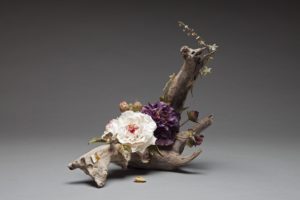
Tracy Byatt, Beauty is a Fading Flower
What materials are integral in your work?
Sugar is the medium I use to sculpt 3D ‘canvases’. Sugar art has been documented as far back as 15th century Renaissance Europe where it was used to create ornate centrepieces for royal banquets. I’m particularly intrigued by the idea of working in an essentially unchanged medium that was once so rare and highly prized, yet we hardly give a bag of sugar a second thought nowadays. It almost feels like reaching back into the Renaissance, with sugar being the constant while the world around us has changed beyond recognition – and not always for the better. I’m still battling the same 15th century enemies too – dampness, humidity and fragility. I’m also routinely mugged by bees from the hives in my garden!
What themes do you pursue?
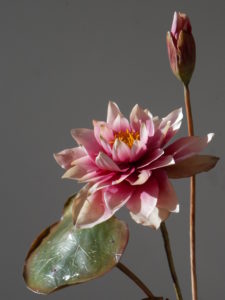
Water Lily, Tracy Byatt
I love to recreate three dimensional still life paintings. My practice references a number of traditions including the still life works of the Flemish masters, the florilegium works of Joseph Banks and the glass botanical specimens of the Blaschka family. I’m driven to replicate every part of a plant as botanically correct as possible. I have no idea why! The impossible challenge to capture every minute detail however never fails to motivate me. I also believe that there is perfection to be found within imperfection and actively seek out those parts of a plant that are so often overlooked because they’re not perceived as aesthetically beautiful when very often they are the very essence of its beauty. Be it wilting petals, desiccated seedheads, etc, I feel it’s the plant’s way of telling us its life story, the season it has had and the stressors it has endured.
What’s the most memorable response you’ve had to your work?
Dr Linda Tyler, the judge of the 2020 Whanganui Arts Review, very kindly commented that my work ‘recreated a sense of a bygone era and transported the viewer back to the 17th century’. I was quite overwhelmed to receive this observation from such a distinguished art expert. It sums up exactly what I have always strived to achieve.
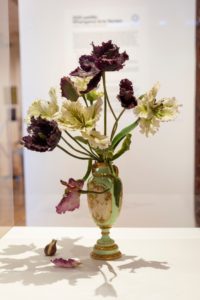
Tracy Byatt, Parrot Tulips – A Study in Sugar. Sugar. 2020 pattillo Whanganui Arts Review Open award winner
What research do you do?
Making botanical subjects from sugar is slow and intensive and involves a lot of studying, pausing, thinking, taking notes and sketching the tiniest of details from specimens as they grow in real time. Much of my research is carried out under magnification, often using a microscope, to study those tiny parts of a plant that are hidden or overlooked. I always reproduce them in my work whether they are visible or not – it would feel like I was doing the plant an injustice if they weren’t included!
What project are you working on now?
I was extremely honoured to be the recipient of the prestigious 2020 Pattillo Project award at the recent Whanganui Arts Review at the wonderful Sarjeant Gallery. This exciting award, most generously sponsored by Anne Pattillo offers a local artist (and in my case an amateur) the unique platform of a solo exhibition under the expert mentorship and professional guidance of the Sarjeant team. I’m very much looking forward to taking up this invaluable opportunity alongside them and developing my art over the coming year.
If you were a crayon, what colour would you be and why?
Green I think. Green is quiet and calm and just does its own thing in the background. I don’t mind what shade, I just want to be really sharp so I can draw lots of tiny detail!
What’s the most interesting thing you’ve seen all week?
Watching a magpie turning crazy somersaults in my pear tree, trying to make the fruit fall to the ground. Very entertaining!
Money is no object. What priceless artwork do you buy?
Whistlejacket by George Stubbs. Without a moment’s hesitation. It’s the most magnificent portrait I’ve ever seen for all kinds of reasons. If money is no object, I’d like a house the size of the National Gallery to house it too please!
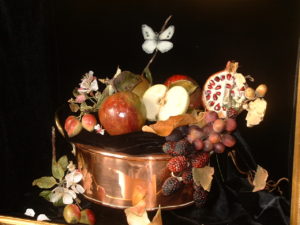
Tracy Byatt, The Four Seasons.
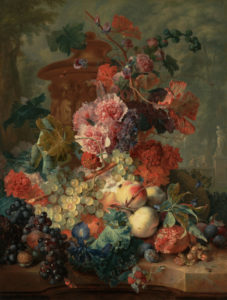
Jan van Huysum, Flower and Fruit Piece, 1722
See the original article in Art Zone here

